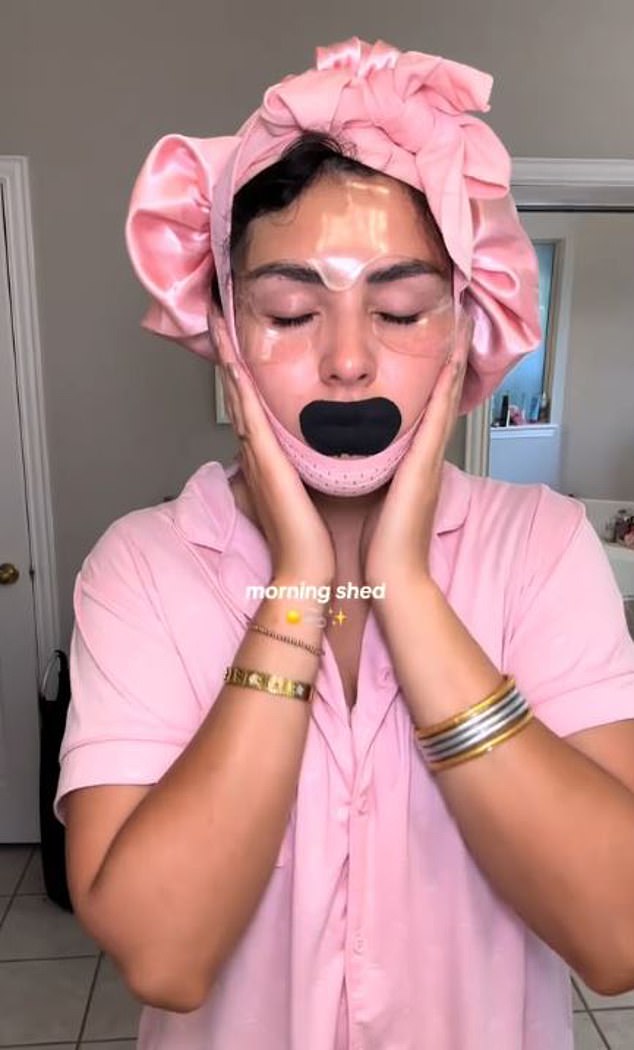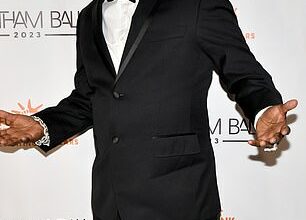Why ‘sleepmaxxing’ – the TikTok trend for a perfect night’s sleep – can actually make your insomnia WORSE…



The young woman in the music video looks bizarre and, frankly, uncomfortable. There appears to be a large black bandage over her lips keeping her mouth shut. There is a thick pink elastic band around her head that is pulled tight under her jaw, and a series of jelly-like spots on her forehead and under her eyes.
It is finished with a pink silk bonnet with ruffles. She removes each item one by one and leans into the camera to reveal, in extreme close-up, her dewy complexion.
The footage from video-sharing app TikTok has been viewed 4.2 million times since it was posted by Texas-based influencer Mayte Myers. She calls it her “morning shed,” as in “throwing away” all the things she wore to bed.
The implication is that this beauty regimen is the way to get better skin. It’s part of a broader, social media-driven sleepmaxxing trend: so-called sleep influencers sharing the often extreme lengths they go to in pursuit of a good night’s sleep.

The woman has a large black bandage over her lips, a thick pink band around her head that pulls under her jaw, and a series of jelly-like spots on her forehead and under her eyes

The footage from video-sharing app TikTok has been viewed 4.2 million times since it was posted by Texas-based influencer Mayte Myers
The mouth tape Mayte wears is designed to force breathing through her nose. Proponents claim this improves dental health, improves oxygen intake during sleep, and promotes restful sleep. However, there is no medical evidence to support this.
The chin strap is supposed to reduce double chins and prevent facial sagging – not something you’d expect teens and twenty-somethings on TikTok to worry about. Again, there is no evidence that chin straps work.
The clear silicone stickers are reusable face masks that supposedly prevent wrinkles and hydrate the skin.
Other sleepmaxxing tips include reducing screen time, avoiding carbs after lunch, taking supplements, eating two kiwis a day, and not drinking anything too close to bedtime. The duration and ‘quality’ of sleep are also obsessively monitored by sleepmaxxers using apps and wearable gadgets.
Could they be on to something?
Experts who spoke to The Mail on Sunday say such extreme efforts are ‘nonsense’ – and warn that buying into the craze could be harmful. ‘Excessive preoccupation with getting to sleep is self-defeating,’ says Dr John Groeger, professor of psychology at Nottingham Trent University and head of the university’s sleep research programme.
‘If you worry about falling asleep – or getting the so-called right kind of sleep – your brain won’t be able to disconnect enough to allow for a good night’s sleep.
“A lot of this sleepmaxxing advice makes the solution part of the problem.” A 2017 US study coined a term – orthosomnia – to describe people seeking treatment for self-diagnosed sleep disorders due to their overuse of sleep trackers and wearable devices.
The researchers warned that the ‘perfectionistic quest for ideal sleep’ was quickly becoming similar to orthorexia – a form of disordered eating in which sufferers become obsessed with consuming only healthy foods.
And introducing props such as jaw straps and mouth tape into the nighttime routine could have a similar effect, explains Dr Rebecca Crowley, a neuroscientist at Royal Holloway, University of London.
“There is a small study showing that overnight mouth taping can improve sleep in people with obstructive sleep apnea, a sleep disorder that causes people to stop breathing for periods of time, but that’s it,” she said.
‘There is no evidence that it benefits anyone else. The big problem with carrying all this stuff while sleeping is discomfort. If you already suffer from insomnia, this can make matters worse.”
Dr. Crowley says people who have trouble losing weight overnight should look at their diet.
“One of the most common pieces of advice we would give is for people to change their diet,” she said.
‘Try eating foods rich in melatonin – the hormone that regulates the sleep-wake cycle – such as bananas, almonds and oatmeal in the evening.’
Likewise, it’s best to avoid obsessing over how much time you spend sleeping, the experts say.
‘People have the idea that everyone should get eight hours of sleep a night,’ says Professor Groeger. ‘Very few people – other than young adolescents and children – get that much sleep.
‘It depends on your age, hormone levels, where you are in your menstrual cycle, what you do during the day – no number is the same for everyone.
‘What the studies show is that sleep is very age-related: older people, for example, do not seem to need more than six hours of sleep per night. While twenty-somethings can easily sleep eight hours or more if they can.”




